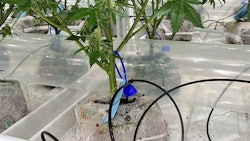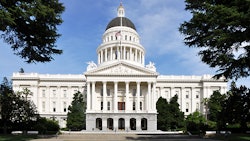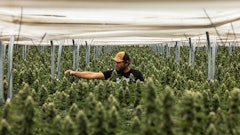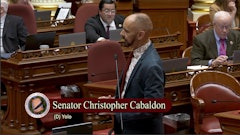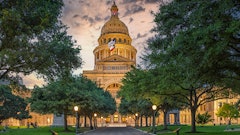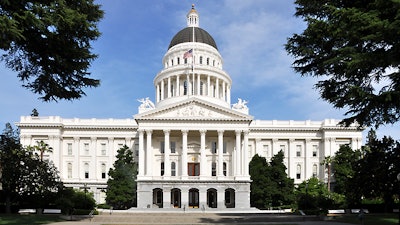
California Gov. Gavin Newsom took action Oct. 8 on several cannabis-related bills on his desk, including legislation that would have created cannabis cafés where patrons could enjoy food and live music.
The California Legislature signed off on Assembly Bill 374 last month. The legislation, sponsored by Assemblyman Matt Haney, D-San Francisco, would have authorized local governments to allow small cannabis retailers to offer food and nonalcoholic beverages, as well as host live music and other performances at their storefronts.
In his veto message over the weekend, Newsom expressed concerns that A.B. 374 would weaken the state’s protections ensuring smoke-free workplaces.
“I appreciate the author’s intent to provide cannabis retailers with increased business opportunities and an avenue to attract new customers,” he said. “However, I am concerned this bill could undermine California’s long-standing smoke-free workplace protections. Protecting the health and safety of workers is paramount. I encourage the author to address this concern in subsequent legislation.”
Newsom also vetoed A.B. 1207, a highly controversial bill that aimed to further clarify what sort of marketing is considered appealing to children, in part by banning state-licensed cannabis companies from using real or fictional humans, fruits and vegetables, or mythical creatures on their packaging and advertising materials.
RELATED: California Governor Vetoes Cannabis Advertising, Marketing Bill
Newsom also announced the signing of several cannabis-related bills Sunday, including:
- A.B. 1171 by Assemblymember Blanca Rubio, D-Baldwin Park – Cannabis: private right of action.
- A.B. 1684 by Assemblymember Brian Maienschein, D-San Diego – Local ordinances: fines and penalties: cannabis.
- S.B. 302 by Sen. Henry Stern, D-Los Angeles – Compassionate Access to Medical Cannabis Act.
- S.B. 540 by Sen. John Laird, D-Santa Cruz – Cannabis and cannabis products: health warnings.
- S.B. 622 by Sen. Ben Allen, D-Santa Monica – Cannabis regulation: plant identification program: unique identifier.
- S.B. 753 by Sen. Anna Caballero, D-Merced – Cannabis: water resources.
In additional announcements Oct. 7 and Oct. 8, Newsom announced the signing of three additional bills impacting the industry:
- S.B. 700 by Sen. Steven Bradford, D-Gardena – Employment discrimination: cannabis use.
- AB 1126 by Assemblymember Tom Lackey, R-Palmdale – Cannabis: citation and fine.
- S.B. 51 by Sen. Steven Bradford, D-Gardena – Cannabis provisional licenses: local equity applicants.
RELATED: Gov. Gavin Newsom Signs Bill That Could Eliminate 43 Million Plastic Plant Tags Per Year
Of note is S.B. 302, which expands Ryan’s Law, legislation Newsom signed two years ago to allow patients with terminal conditions to use medical cannabis. S.B. 302 additionally allows seniors aged 65 and older with a chronic disease to use medical cannabis in skilled nursing facilities, congregate living health facilities, special hospitals and hospice facilities, as well as while receiving care from a home health agency.
Newsom said in a statement that while he signed the legislation into law, he would like to see a clean-up bill next year to clarify what he calls “a drafting error” in the bill.
“Specifically, this bill excludes hospitals from its provisions, but could be interpreted to narrow existing law for hospital patients that have both a terminal illness and a chronic disease,” Newsom said. “It is my understanding this was not the intent. Many individuals with chronic diseases seek medicinal cannabis as an alternative to opioids for treatment of chronic pain, and their living situation should not be a barrier to access. I believe signing this legislation has greater benefits than concerns, recognizing that the policy will be clarified.”
S.B. 51 is another bill that Newsom would like refined in the next legislative session. The legislation allows the California Department of Cannabis Control (DCC), until Jan. 1, 2031, to issue provisional licenses for up to five years to applicants for local social equity dispensary licenses.
“After the voters enacted the Medicinal and Adult-Use Cannabis Regulation and Safety Act (Proposition 64), provisional cannabis licenses were created as a temporary bridge to allow pre-Proposition 64 operators to transition into a newly-regulated cannabis market,” Newsom said in a statement on S.B. 51. “Though the state has made significant progress since the passage of Proposition 64, local opposition, rigid bureaucracy, and federal prohibition continue to pose challenges to the industry and barriers to entry. Equity applicants, who bore the brunt of California's failed history of cannabis prohibition, are disproportionately impacted by a lack of access to capital and technical support, steep licensing fees, lengthy land-use approvals, environmental requirements, and more.”
RELATED: California’s Licensing Cliff Pushes Cannabis Growers to Edge of Extinction
Newsom said that while he supports Bradford’s effort to provide temporary relief to social equity applicants, S.B. 51 does not go far enough to “address the fundamental issues that continue to increase costs and uncertainty for those seeking to participate in the legal market.”
“To the contrary, another extension may remove pressure to confront local permitting challenges and slow efforts to facilitate the transition of provisional licenses to annual licensure,” he said. “I look forward to working with the Legislature to consider long-term solutions to streamline licensing requirements and move us beyond short-term fixes. These measures must balance the need for accountability and reform without further impeding applicants already burdened by restrictive local licensing processes."









